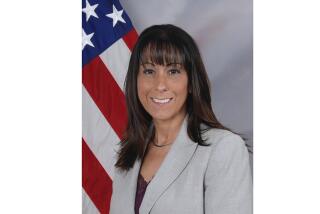More Probes for Wildlife Waystation
- Share via
ANGELES NATIONAL FOREST — The state attorney general’s office has reopened its investigation of the Wildlife Waystation’s finances, and the district attorney’s office has demanded the sanctuary correct alleged health and safety violations, officials confirmed this week.
The two offices are the latest to join a growing number of state and federal agencies scrutinizing the business practices of the nation’s largest wildlife sanctuary for injured and abandoned animals.
New information led the attorney general to return to the case, which began in 1995 when several Waystation board members resigned after alleging director Martine Colette misspent more than $500,000, said Sandy Michioku, a spokeswoman for the attorney general’s office.
“We do have an ongoing investigation at this time,” she said Monday.
Although she refused to provide details, Michioku said the office is responsible for investigating suspect financial dealings of nonprofit agencies. A discovery of wrongdoing could lead to a civil complaint ordering the Waystation--which cares for hundreds of animals--to pay back mishandled funds to donors, she said.
And in an April 13 letter, Assistant Dist. Atty. Robert Miller demanded the Waystation submit a plan for cleanup by Friday or risk criminal charges.
The Waystation’s problems have been mounting since April 7 when officials with the state Department of Fish and Game barred the refuge from accepting any more animals and closed it to the public. The U.S. Department of Agriculture also is investigating the refuge for alleged violations of animal-care codes.
*
Fish and Game inspectors allege that Waystation workers house animals in small, rundown cages and illegally dump animal waste into streams that run through the property. The Waystation’s operating license was suspended in 1997 by Fish and Game, and it has not been renewed because the refuge has failed to comply with safety regulations, officials said. Since then, Fish and Game has tried to bring the Waystation into compliance.
“The evidence collected by the Department of Fish and Game raises alarming concerns about the serious risks posed to public health and safety created by the Wildlife Waystation’s procedures,” Miller, an environmental-crimes prosecutor, wrote. “It is not our desire to permanently close your client’s facility, but these serious risks to public health and safety cannot continue to go unabated.”
This is not the first time the sanctuary’s finances have come under scrutiny. The IRS opened an investigation in 1995, but no charges were filed and the case remains open, officials said. They refused to say whether wrongdoing was discovered.
And in an independent report to the board of directors in 1997, fund-raising consultant Cathy Nelson blasted the Waystation’s fiscal practices, which included paying Colette $117,000 a year while the animal sanctuary in Little Tujunga Canyon nearly went broke.
Colette said Tuesday that all disputes have been settled with current board members, and no financial improprieties exist at the wildlife refuge. The “witch hunt” by federal and state agencies probing the Waystation will turn up no foul dealings, she said.
“It’s fascinating to me personally that there are 300,000 people who go through here each year,” Colette said. “We have 250 volunteers who are always here. We have 63 staff members who are here all the time. We have the public by the hundreds in here. If there was something really wrong, how long do you think it would have been kept quiet?”
Some board members raised questions three years ago when the board voted to cut staff salaries by 10% to prevent financial ruin and later voted to invest $10,000 in plans for a commercial wildlife park in Arizona.
Nelson, the consultant hired by the board, reportedly signed a confidentiality agreement before submitting her report. But in a letter to board members, she accused them of mishandling funds, and she foreshadowed continuing money struggles for the Waystation, the largest sanctuary of its kind in the nation.
Six months after Fish and Game refused to renew the Waystation’s permit, Nelson said the board “smacks of a private operating foundation” and that there was “only a slim possibility that your devastating financial situation can be rescued.”
One key solution, she suggested, would be to elect a board chairperson who is not a paid staff member. Colette is both board chairwoman and executive director of the facility. The board pays her $63,000 a year in wages. It has invested about $600,000 in the property, yet Colette holds title to all but 20 acres of the 160-acre site. The Waystation pays her $54,000 annually to lease its portion.
*
The Waystation came within two months of insolvency, and the financial problems began to affect the animals’ care, Nelson wrote.
“It was human negligence and abuse that brought the animals to the Waystation’s care,” Nelson wrote. “How ironic it is, that again, human negligence and abuse place their fate at risk.”
More to Read
Sign up for Essential California
The most important California stories and recommendations in your inbox every morning.
You may occasionally receive promotional content from the Los Angeles Times.













